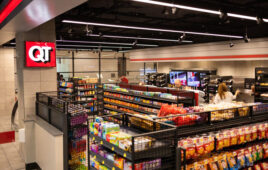Which came first, the deli or the sandwich program? Pittsfield, MA-based O’Connell Oil may be in the minority, but it was trying to become a destination for deli meats long before it ever sold a sandwich. With 15 of its O’Connell Convenience Plus stores offering full-blown deli cases and fresh sandwiches, the chain has made a name for itself in Massachusetts for being the place customers go to do their deli shopping.
“We got into the deli business about 12 years ago,” says John Gaudrault, senior vice president of the 42-store chain. “We had a bakery and a deli in a larger store and we did okay with it, but the general public’s perception then was that they weren’t comfortable buying deli meats in a c-store. So we started doing everything we could to change that perception and make our customers as comfortable in our stores as they are in a grocery store. We focused on cleanliness, appearance and presentation. And we devoted a deli person to present him or herself and take care of those customers specifically. It really gives the customer a feeling of being taken care of.”
Over the years, O’Connell has retrofitted older stores to carry the deli program, which occupies 600 to 800 sq. ft. of the chain’s 3,500 sq. ft. stores, and has added it to new builds as they were going up. It currently has 15 delis with another five on the horizon for fiscal 2005.
“We originally started out using 4-ft. or 6-ft. deli cases to merchandise our meats,” says Gaudrault. “Now we’ve bumped it up to 8-ft. to 10-ft. deli cases with the expansion of the lines. We carry several different types of hams, like Crackus, Russer, specialty and water-added domestics, along with Willow Brook Turkey, Land-O-Lakes Cheese and Jordan’s Cooked Roast Beef. We’ve also added ancillary products like baked loaf or Polish loaf and seasonally offered fresh franks by the pound with the natural casing included. With our growth, we’ve become a true destination for deli meats and store-made sandwiches and wraps.”
Next to the deli case O’Connell has a 4-ft. to 6-ft. open air self-serve sandwich cases, where the customer can select from weekly special sandwiches, which could be seafood salad on a pita or a ham and Swiss sandwich. In addition, two years ago O’Connell got away from handwrapping its sandwiches in favor of merchandising them in clear covered clamshell packages. The clamshells provide a more professionally-sealed product that gives the customer a clear view of the product. While it was a more expensive way of packaging the product, Gaudrault says customers have responded to the change by “voting with their dollars.”
“They say people eat with their eyes first,” he says. “The clamshell packages increased our costs by 10′ to 15′, but by switching to packaging that gave customers a clearer view of the product, our sales increased 20% to 30%.”
DIY or branded?
Before ramping up its own deli program, O’Connell sought the help of the experts. The company already had its own sandwich program in place when it implemented two Subways about seven years ago, which continue to be successful. But the proprietary program really took off during those early Subway years. O’Connell didn’t have as much luck with a pizza program it had implemented at one location. But when it came to moving forward, the company felt it would be less restricted by creating a program all its own.
“We decided to pursue a proprietary sandwich program because of the flexibility to introduce new products at any time,” says Gaudrault. “When the low-carb craze started we introduced low-carb wraps at 10 locations, like sundried tomato, garlic and wheat wraps. The sales went through the roof. Having our own proprietary program really allowed us to get into wraps where we would have been handcuffed with national brands that might not have wanted to take that on.”
The deli began as a morning operation, meaning customers could start purchasing deli meats and store-made sandwiches as early as 6 a.m. (The deli closes at 10 p.m.) But O’Connell has started focusing on lunch and dinner, which include soups, take-home pasta salads in seven different varieties and other side options like red bliss potato salad. The pasta salads come from a Boston-based manufacturer and the soups are a national brand, Knorr, with flavors that include chicken noodle, tomato basil, New England Clam chowder, beef stew, minestrone, split pea with ham and cream of broccoli. The company rotates the soups and salads out every two weeks with the introduction of a new sandwich special.
O’Connell Oil’s deli generates $700 a day in deli meat sales, and that number continues to grow. Some of its stores do in excess of $400 a day in proprietary sandwiches, which doesn’t include sales from the roller grill.
As the deli continues to attract business, O’Connell finds new ways to increase the dollar ring and reinvent itself as a full-service deli provider.
“We’ve started doing a huge business with platters for private parties and get-togethers,” says Gaudrault. “We offer three different platters that can be done a day or two ahead of time. Depending on the platter, it will feed 20 to 30, 40 to 60 or 75 to 100, and the price points depend on what they want. If we have it, we’ll do it.
“When we first started doing it, we didn’t advertise our prices because we knew the grocery stores would crush us,” he continues, “but our customers were overwhelmed at the size of the platters and the value they were getting. Now not only are our customers coming to us for meats sliced by the pound and for sandwiches at lunch, but they think of us for graduation parties, baby or wedding showersany kind of large gathering or home entertaining.”
The comeback kids
O’Connell Oil doesn’t have a lot of convenience store competition, but it does go head-to-head with grocery stores. So the chain strives to make the experience of shopping its stores more convenient. When customers go to the grocery store for deli meats, they stand in a line of 10 or more peopleand they’re not happy, according to Gaudrault. O’Connell has circumvented that problem by allowing customers to fax or call orders in ahead of time.
“We offer an array of meats for time-starved customers,” says Gaudrault. “They let us know what they need ahead of time and we’ve got it all ready for them when they walk in the door. It was something we started about nine months ago, and some of our stores are up to 30 phone orders a day with the same number of fax orders.
So far the customer feedback has been tremendousthey love that they don’t have to wait in line, our prices are fair and they recognize we’re doing all we can to expedite their experience.”
With its deli business booming, O’Connell is validated in devoting employees specifically to the deli. But this has always been a key to its success and a big reason why its deli has become a destination for customers.
“Some or our stores have two dedicated deli employeesespecially around the holidays or weekends when we get really busybut there is always at least one,” says Gaudrault. “We made the commitment a long time ago not to cross-train our employees to go from the register to the deli counter. Nothing is worse than when a customer is waiting for deli service and having an employee cross over. It leaves the customer waiting and it doesn’t promote the cleanest conditions. Customers are cognizant of cleanliness and attention to detail. It’s been a real commitment of labor dollars on our part, but it looks like it’s working out.”
As O’Connell looks to the future, it wants to make its deli offer even more irresistible to
customers. It also wants to increase the probability of selling more deli foods, meaning alternative placements. The company is exploring the viability of placing 12-ft. to 15-ft. open-air sandwich cases in its aisles, which will allow customers to browse the refrigerated sandwiches while they peruse the cold drinks and fresh fruit.
“We see foodservice as a growing category for us,” says Gaudrault. “We’re also contemplating adding selected fresh meats and fresh baked breads. Several of our stores have baking capabilitieswhy not capitalize on it?”




